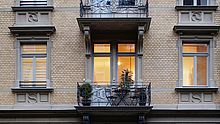Over 80 percent of the apartments in cities like Berlin are occupied by tenants. In total, there are roughly 17 million rented households in Germany. The professional housing industry provides almost half of these residential units. Not only must the private and public sector housing industry provide adequate accommodation at affordable prices, they also need to adhere to climate protection requirements. This presents the industry with a particular challenge. On the one hand, the energy-efficient refurbishment must not lead to a significant rise in rent and hence to social displacement. On the other hand, the companies are commercial enterprises and reliant on the cost effectiveness of the energy efficiency measures.
Interface with housing developers
dena remains in close dialogue with the professional housing industry and central associations with the private and public sector housing developers. Together they discuss strategies and measures, as well as regulatory and funding frameworks for the energy-efficient refurbishment of apartment buildings. Moreover, dena has initiated the Alliance for Building Energy Efficiency and coordinates its activities. This cross-sectoral alliance of leading representatives from industry, research, skilled trades, planning, commerce, energy supply and finance advises politicians and promotes clear measures within industry as a means of substantially increasing the energy efficiency of Germany’s buildings.
Successful and energy-efficient refurbishment of rental housing
The completed “Efficient Houses Pilot Project” has already revealed the gigantic potential still slumbering in this area. Over 200 apartment buildings received energy-efficient refurbishment as part of this project from 2004 onward. The results indicated that energy-efficient construction, when completed to professional standards, can reduce energy consumption by up to 80 percent. Moreover, the pilot project demonstrated that numerous energy-efficiency refurbishment measures can also be implemented for rental housing and that the efficient house standard 70 is within reach in this context.
Refurbishment roadmap for the housing industry
dena offers consultancy for large public sector property management firms on the development of long-term refurbishment strategies. This kind of refurbishment roadmap allows the systematic registration and analysis of energy consumption and savings potential in building portfolios. In this way, it enables planning of how energy-efficient refurbishment of the portfolio might be implemented. Among others, Germany’s largest housing developer, Vonovia (formerly Deutsche Annington), the Institute for Federal Real Estate and the Brandenburgischer Landesbetrieb für Liegenschaften und Bauen have already used this service.





